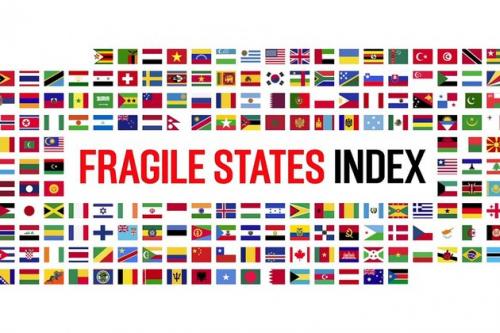
https://fragilestatesindex.org/category/analysis/fragile-states-index-20...
According to the famed philosopher, Eric Idle, one should always look on the bright side of life. “If life seems jolly rotten,” Mr. Idle would have us know, “There’s something you’ve forgotten.”1 From the perspective of the Fragile States Index (FSI), when the constant stream of the 24-hour news cycle peddles continual doom and gloom about the state and future of the world, that ‘something we’ve forgotten’ tends to be the long-term arc of development and increasing resilience. Countries move at different paces, for sure. Naturally, there will always be setbacks, shocks, and pressures. Of course, around the world there is still widespread fragility and vulnerability, plenty of poverty and inequality, and conflict and illiberalism. But broadly speaking, over the long-term, the world is becoming steadily less fragile. It often takes cold, hard data — like that produced by the FSI — to demonstrate that for all the negative press, there is significant progress occurring in the background.
MOST WORSENED COUNTRIES
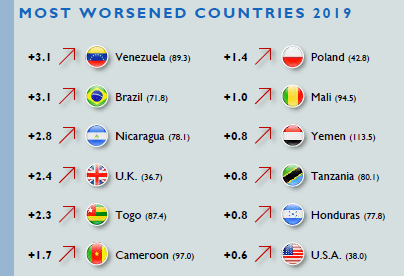 Despite the constant incremental progress demonstrated by the majority of countries on the 2019 FSI, several countries have nevertheless stood out for increases in fragility and instability. Perhaps more interestingly is a growing division between the majority of the world that is slowly progressing, versus a handful of countries that are following a solid trend in the opposite direction. Of the 20 most worsened countries in the 2019 FSI, nine of those countries were also among the 20 most worsened countries in the 2018 FSI. Three of those countries — namely, Brazil, the United States, and Venezuela — have been among the 20 most worsened countries for each of the three most recent FSIs.
Despite the constant incremental progress demonstrated by the majority of countries on the 2019 FSI, several countries have nevertheless stood out for increases in fragility and instability. Perhaps more interestingly is a growing division between the majority of the world that is slowly progressing, versus a handful of countries that are following a solid trend in the opposite direction. Of the 20 most worsened countries in the 2019 FSI, nine of those countries were also among the 20 most worsened countries in the 2018 FSI. Three of those countries — namely, Brazil, the United States, and Venezuela — have been among the 20 most worsened countries for each of the three most recent FSIs.
Two countries tied for most-worsened over the past 12 months. Venezuela has been beset by enormous turmoil, and in the wake of a contested and deeply flawed election in 2018, now finds itself with two leaders — the incumbent, Nicolas Maduro, and Juan Guaidó, the President of the National Assembly who declared himself president of the country after the position of president was declared constitutionally vacant (and was subsequently recognized as such by dozens of countries including most of Venezuela’s regional neighbors). Much of the political turmoil in Venezuela has taken place in the first few months of 2019, and was thus not included in the 2019 FSI. Undoubtedly, had those events occurred during the 2019 FSI sample period, Venezuela’s score would have likely been even worse. However, the 2019 FSI detected much of the underlying pressure on Venezuela, from widespread human flight, to a public health catastrophe, economic collapse, and significant crime and violence.
Though Brazil tied with Venezuela for most-worsened country in 2019, arguably its proximity to the growing instability in neighboring Venezuela was likely — and somewhat ironically — enough to see its score increase even further beyond that which reflects its own internal challenges. Nevertheless, Brazil’s internal challenges remain significant, with tumultuous politics and a new president, Jair Bolsonaro, who came to power through a campaign fueled by harsh right-wing rhetoric that included sympathy with the country’s former dictatorship, threats of retribution (and even death) against his political opponents, and intolerant views on a vast spectrum of society from women to homosexuals to indigenous Brazilians. Though the fractious election campaign and the divisive rhetoric of Mr. Bolsonaro no doubt pushed Brazil’s score higher than it might otherwise have been, the country’s poor performance is far more deeply-rooted in a general economic malaise, rampant corruption, and crumbling public services that have seen Brazil’s FSI score worsen for six straight years. Just as with previous observations that the rise of President Donald Trump was more clearly a symptom of a long-term trend of growing pressure on the United States’ in areas such as Group Grievance and Factionalized Elites rather than a cause, it is possible to see Brazil’s scores in the same light — that as divisive as Mr. Bolsonaro may be, and as much as his administration may have the potential to contribute to a worsening in Brazil’s performance, Brazil’s negative trend significantly pre-dates the 2018 election.
Nicaragua has ranked as the third-most worsened country for 2019 after the country’s sharp turn for the worst after years of relative stability. After a collapse of support from key stakeholders, unpopular policy initiatives, and a naked attempt to retain power within the family of President Daniel Ortega, hundreds of thousands of Nicaraguans took to the streets in protest, met by a severe and brutal response by the government. As the previous Ortega regime demonstrated remarkable resilience, it is unclear as to how long the crisis will endure. Regardless, even for a country otherwise demonstrating relative stability, it demonstrates how rapidly a country’s fortunes can change, and just how important a country’s resilience is in proportion to the level of fragility it confronts.
After scoring among the top 10 most worsened countries in the 2018 FSI, the United Kingdom is this year the fourth-most worsened country, The United Kingdom has again seen increases in its indicator scores for Group Grievance, Factionalized Elites, and State Legitimacy, among the same indicators that have been driving the country’s spiral over the past decade — indeed, more long-term, the United Kingdom is now ranked as the 15th most worsened country on the FSI since 2009. Much of the current turmoil can be attributed to the country’s farcical efforts to make good on the 2016 referendum where, after a highly divisive — and arguably, disingenuous and even dishonest — campaign, a slim majority of Britons voted in favor of leaving the European Union. Given that the government’s efforts to execute “Brexit” have gone from bad to worse in the early months of 2019, it is likely that the United Kingdom’s score could easily have been much worse — and may well be in the 2020 FSI. Nevertheless, it is important to recognize that Brexit is still a relatively new phenomenon, and much of the long-term worsening for the United Kingdom was in-train well before the Brexit referendum. Indeed, even before the Brexit referendum took place, the United Kingdom had the seventh-worst trend for the three indicators mentioned above. This suggests that the country’s ills are much more deeply-rooted and unlikely to be solved in the near-term, regardless of Brexit.
Just as the FSI was able to chart a remarkably aligned descent of both the United Kingdom and the United States over the past few years on select indicators, so the trend continues of both countries following a similar trajectory. Though, this year, the United States’ descent has been slowed somewhat by improving economic indicators as the economy has continued to defy gravity. This economic success has to a degree masked increases on indicators such as State Legitimacy, as well as the administration’s reaction to the refugee “crisis” that has seen a worsening of the United States’ Human Rights and Rule of Law indicator.
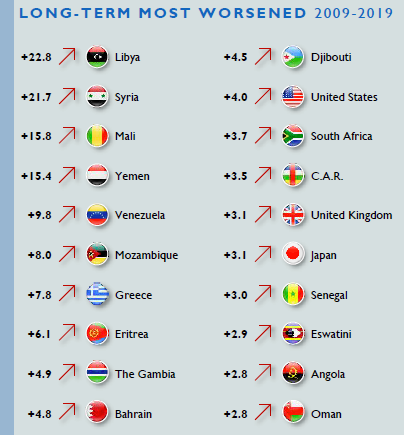 Over the long-term, Libya continued to rank as the most-worsened country of the past decade, closely followed by Syria, Mali, and Yemen, as all four countries find themselves embroiled in ongoing civil conflict. Notably, the ranking of Venezuela as the fifth-most worsened country since 2009 demonstrates how the country’s current woes are the result of a severe long-term worsening trend. Indeed, more recently, Venezuela ranks as the most-worsened country of the past five years, making clear its rapid rate-of-change. Though many of the countries among the top 20 most-worsened seem to have “peaked” and have begun trends in a more positive direction — Greece, for example, despite being ranked seventh-worsened over the past decade has more recently seen a three-year improving trend — there are still some concerning trends. Mozambique, for example, worsened significantly from 2006-2016 and has remained at that elevated level as conflict has threatened to renew in the north of the country.
Over the long-term, Libya continued to rank as the most-worsened country of the past decade, closely followed by Syria, Mali, and Yemen, as all four countries find themselves embroiled in ongoing civil conflict. Notably, the ranking of Venezuela as the fifth-most worsened country since 2009 demonstrates how the country’s current woes are the result of a severe long-term worsening trend. Indeed, more recently, Venezuela ranks as the most-worsened country of the past five years, making clear its rapid rate-of-change. Though many of the countries among the top 20 most-worsened seem to have “peaked” and have begun trends in a more positive direction — Greece, for example, despite being ranked seventh-worsened over the past decade has more recently seen a three-year improving trend — there are still some concerning trends. Mozambique, for example, worsened significantly from 2006-2016 and has remained at that elevated level as conflict has threatened to renew in the north of the country.
MOST IMPROVED COUNTRIES
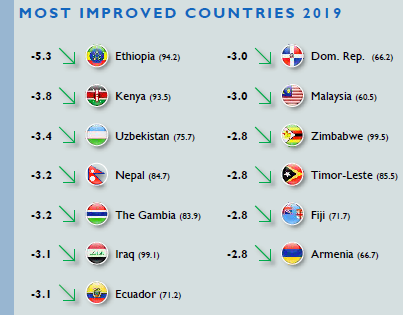 After having ranked as the most-worsened country in the 2017 FSI, Ethiopia has staged a remarkable turn-around this year, ranking as the most-improved country in the wake of the ambitious reform agenda of Prime Minister Abiy Ahmed that has led to more political and social inclusiveness, breaking down the previous ethno-centric system that the country endured for decades. Ethiopia has also benefited from — and contributed to — a decrease in regional tension, marked by a détente with neighboring Eritrea, with whom Ethiopia fought a war only two decades ago.
After having ranked as the most-worsened country in the 2017 FSI, Ethiopia has staged a remarkable turn-around this year, ranking as the most-improved country in the wake of the ambitious reform agenda of Prime Minister Abiy Ahmed that has led to more political and social inclusiveness, breaking down the previous ethno-centric system that the country endured for decades. Ethiopia has also benefited from — and contributed to — a decrease in regional tension, marked by a détente with neighboring Eritrea, with whom Ethiopia fought a war only two decades ago.
Over the long-term, former Soviet states continue to dominate the list of most-improved countries, with Belarus, Georgia, Kyrgyz Republic, Moldova, Tajikistan, Turkmenistan, and Uzbekistan all ranking among the Top 20. Of course, it is important to recognize that among the most improved countries are some that continue to be restrictive, autocratic, and subject to closed civic space. Herein lies an important distinction in reducing fragility over time — when countries begin from a poor starting point, significant gains are much easier to detect and measure and even relatively simple reforms can greatly reduce a country’s fragility. The same can be said for others among the Top 20 that are post-conflict countries, such as Colombia and Sri Lanka — in recovering from conflict, simply not being at war is pretty obviously a significant improvement. It is therefore likely no accident that former Soviet states as well as post-conflict countries are among the most improved since their rate-of-change has been faster. However, whether this trend can continue without more fundamental political, economic, or social change is unclear.
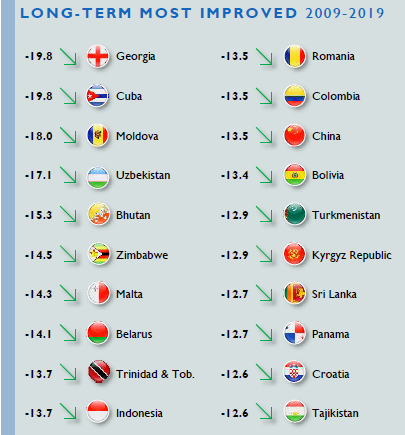 Though the rate-of-change may not be sufficiently fast to rate among any “Top” lists, one quiet improvement in FSI 2019 is truly remarkable. Throughout the life of the FSI, there has been considerable interest in the number of African countries that are ranked as highly fragile. Indeed, among the 30 most fragile countries in the 2019 FSI, 21 of them are to be found in Africa. So much so that in previous years, the FSI has even been accused of having an “anti-Africa bias.” And yet, in 2019, an African nation has, for the first time, ranked in the “Very Stable” category, with Mauritius ascending to join the likes of the United Kingdom and United States. Indeed, if the year-on-year changes of 2019 are repeated in 2020, Mauritius — a member of both the African Union and the Southern African Development Community — could easily rank better than both the United Kingdom and United States in the 2020 FSI. And by no means is Mauritius alone — both Botswana and the Seychelles now rank in the Stable Category, demonstrating the increasing level of stability in many parts of Africa.
Though the rate-of-change may not be sufficiently fast to rate among any “Top” lists, one quiet improvement in FSI 2019 is truly remarkable. Throughout the life of the FSI, there has been considerable interest in the number of African countries that are ranked as highly fragile. Indeed, among the 30 most fragile countries in the 2019 FSI, 21 of them are to be found in Africa. So much so that in previous years, the FSI has even been accused of having an “anti-Africa bias.” And yet, in 2019, an African nation has, for the first time, ranked in the “Very Stable” category, with Mauritius ascending to join the likes of the United Kingdom and United States. Indeed, if the year-on-year changes of 2019 are repeated in 2020, Mauritius — a member of both the African Union and the Southern African Development Community — could easily rank better than both the United Kingdom and United States in the 2020 FSI. And by no means is Mauritius alone — both Botswana and the Seychelles now rank in the Stable Category, demonstrating the increasing level of stability in many parts of Africa.
Just as Mauritius this year became the first African country to break through to the Very Stable category, it is also important to recognize that Singapore became the first Asian nation to move into the Sustainable category. Often, Mauritius has been referred to at the ‘Singapore of Africa’ — both countries’ leading positions within their regions may suggest that it is actually a meaningful comparison.
A WORD ABOUT RANKINGS
Fifteen years ago, when the first Failed States Index was published in Foreign Policy magazine, much of the emphasis and attention was focused on the rankings. The question was invariably, ‘who is the world’s most failed state?’ However, a decade-and-a-half later, now armed with 15 years of trend data, the discourse is fortunately far more nuanced and now the focus is much more on trends and rate-of-change — and, more importantly, measuring a country’s performance over time against itself rather than against its peers.
Nevertheless, the temptation to rank countries — particularly wherever quantitative data is involved — is nearly inescapable. To that extent, it is worth mentioning that the 2019 FSI saw a new country claim the unfortunate distinction of top position, a position held by only three other countries in the history of the FSI — Cote d’Ivoire ranked number one in the very first FSI in 2005, before Somalia held the position for some years until it began trading places with South Sudan upon that country’s independence and its initial entry into the 2012 FSI. This year, Yemen claimed the top position for the first time as a result of its civil war and humanitarian catastrophe. Although Yemen’s top ranking may provide cause for idle chatter, really the most attention should be given to its rapid worsening over the past decade, and the regional instability and power plays for which its population are unspeakably suffering. Equally, as much as they are neither the most fragile state in the 2019 FSI, there is still much to be concerned about in both Somalia and South Sudan as they continue to be wracked by conflict and deeply entrenched poverty and suffering. A ranking, in the end, is pretty meaningless — it is the underlying scores, and as far as they can be determined, the specific root causes and drivers of instability that must be recognized and addressed.
With civil conflict continuing to rage in Libya, Mali, Syria and Yemen, Venezuela on the brink of collapse, worsening divisions in Brazil and the United States, and one own-goal after another in British governance, it is easy to feel that the world is falling apart at the seams. And, for many, that is the day-to-day reality. However, the 2019 FSI suggests that, for much of the world, reality is improving, at least incrementally. For 146 of the 178 countries analyzed by the FSI, 2019 is at least slightly better than 2018; a similar number of countries have meaningfully improved over the past decade, suggesting that the results of 2019 are not an outlier. Certainly, there is still much conflict, poverty, and inequality in the world; there is still significant fragility, risk, and vulnerability. But the arc of development is long, and slow. The data of the FSI suggests that the majority of countries are slowly, but surely, making their way along that arc and providing a more hopeful future for their people — the data makes clear that there is enough reason to “always look on the bright side.”2
Endnotes
1. Idle, Eric. Monty Python’s Life of Brian.
2. Ibid.
"There is still widespread fragility and vulnerability, plenty of poverty and inequality, and conflict and illiberalism. But broadly speaking, over the long-term, the world is becoming steadily less fragile. It often takes cold, hard data — like that produced by the FSI — to demonstrate that for all the negative press, there is significant progress occurring in the background." J.J. Messner,
In 2019, an African nation has, for the first time, ranked in the “Very Stable” category, with Mauritius ascending to join the likes of the United Kingdom and United States. Just as Mauritius this year became the first African country to break through to the Very Stable category, it is also important to recognize that Singapore became the first Asian nation to move into the Sustainable category.














Add new comment